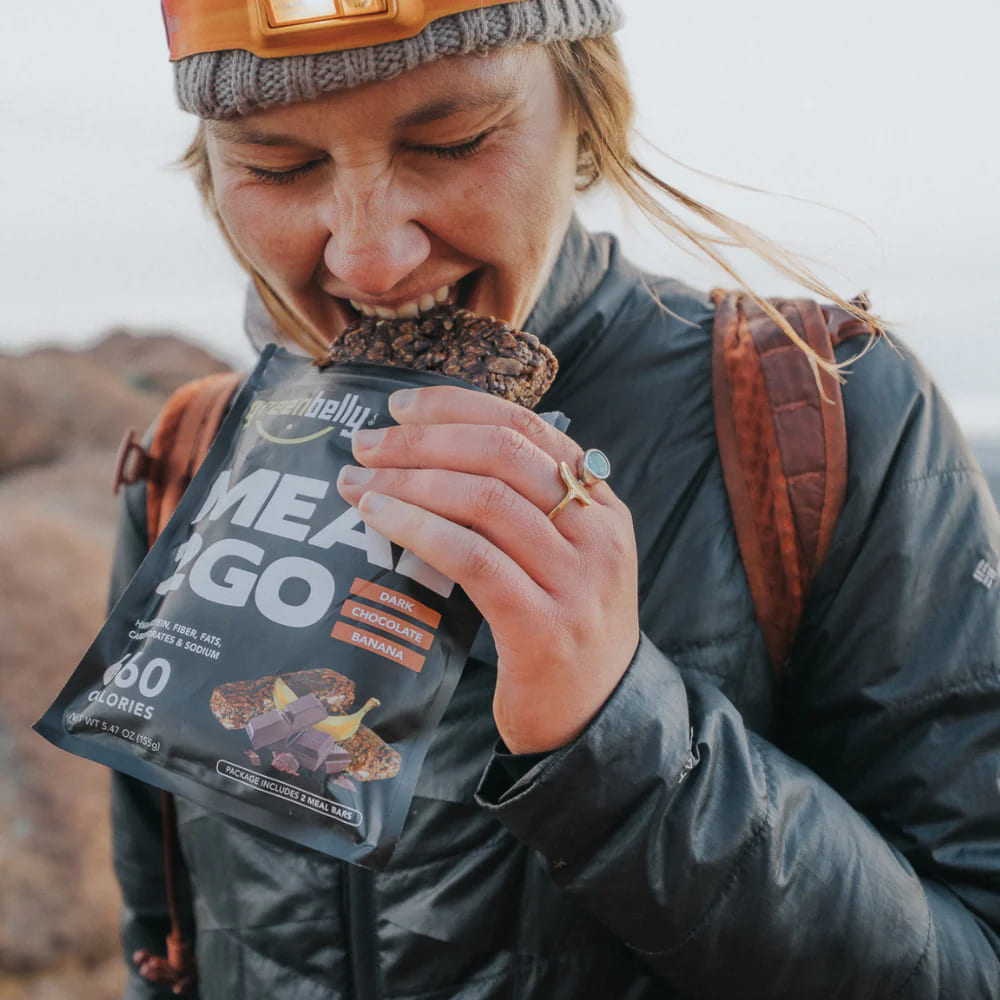When looking for the best down jacket, there are many things you need to take into consideration such as the fill weight and fill power, whether it has a Durable Water Repellant (DWR) coating, or whether the shell is made from ripstop nylon.
We tested the best down jackets in terms of warmth, weight, and packability and this is what we found. Read on to see which model is best for you and get some buying advice.
Table of Contents
Best Down Jackets
The best down jackets are:
- Best Overall Down Jacket: MOUNTAIN HARDWEAR GHOST WHISPERER
- Best Budget Down Jacket: FORCLAZ TREK 100 BY DECATHLON
- Most Sustainable Down Jacket: PATAGONIA M'S DOWN SWEATER
- Lightest Down Jacket: MONTBELL PLASMA 1000
- Warmest Down Jacket: FEATHERED FRIENDS EOS
- Best Down Jacket for Mountaineering: MAMMUT BROAD PEAK IN
| Model | PRICE | Weight | Fill Power | Fill Weight | Denier | Score |
|---|---|---|---|---|---|---|
| 1. Mountain Hardwear Ghost Whisperer | $325 | 8.3 oz | 800 fill | 2.5 oz | 7D x 10D | 8/10 |
| 2. Montbell Plasma 1000 | $329 | 4.8 oz | 1000 fill | 1.6 oz | 7D | 8/10 |
| 3. Patagonia M's Down Sweater | $229 | 13.1 oz | 800 fill | 1.4 oz | 20x30D | 8/10 |
| 4. REI Magma 850 Down Hoodie 2.0 | $219 | 13.8 oz | 850 fill | 4.2 oz | N/A | 8/10 |
| 5. Forclaz Trek 100 by Decathlon | $79.99 | 10.2 oz | 800 fill | 3.1 oz | 15D | 8/10 |
| 6. RAB Microlight Jacket | $250 | 14 oz | 700 fill | 4.7 oz | 30D | 8/10 |
| 7. Uniqlo Ultralight Jacket | $79.90 | 8.3 oz | 640+ fill | N/A | 20D | 8/10 |
| 8. Feathered Friends Eos | $389 | 10.8 oz | 900+ fill | 4 oz | N/A | 8/10 |
| 9. Western Mountaineering QuickFlash Jacket | $400 | 8 oz | 850+ fill | 2.5 oz | 12D | 8/10 |
| 10. Eddie Bauer CirrusLite Down Jacket | $129 | 9 oz | 650 fill | 2.8 oz | 20D | 7/10 |
| 11. Mammut Broad Peak IN | $329 | 13.4 oz | 800 fill | 4.1 oz | 20D x 20D | 7/10 |
| 12. L.L. Bean Ultralight 850 Down | $249 | 18.7 oz | 850 fill | 3.8 oz | N/A | 7/10 |
| 13. Arc'teryx Cerium Hoody | $400 | 9.8 oz | 850 fill | 3.5 oz | 10D | 7/10 |
| 14. Outdoor Research Helium Down Hoodie | $209-279 | 15.4 oz | 800+ fill | 3.9 oz | 15D x 30D | 7/10 |
| 15. Cotopaxi Fuego Hooded Jacket | $275 | 14 oz | 800 fill | N/A (no info) | 20D | 7/10 |
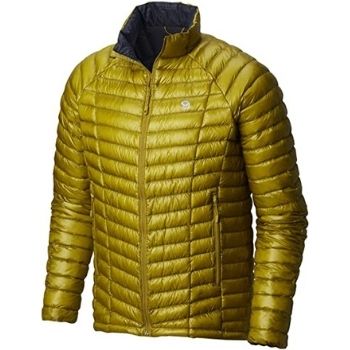
PROS:
✅ Excellent warmth to weight ratio
✅ Ultralight
✅ Packable
CONS:
❌ Price
❌ Durability
KEY SPECS
- Weight: 8.3 oz (0.52 lbs)
- Fill weight: 2.5 oz
- Fill power: 800-fill
- Shell material: Whisperer 7D x 10D Ripstop Nylon
The Mountain Hardwear Ghost Whisperer’s excellent warmth-to-weight ratio makes this our best overall down jacket. It’s a very lightweight and packable down jacket thanks to its high fill power and thin denier fabric. We found the drawback is a bit of durability loss, but if you take care of the jacket it will last a long time. The jacket's small baffles and trim, athletic fit make it perfect for layering and stowing on the go. The fit runs slim, especially across the waist, if you like some extra room in your jacket, best size up. The hooded version is one of the lightest hooded down jackets we tested.
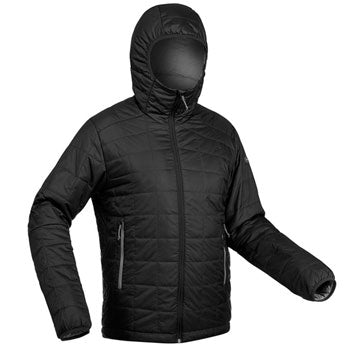
PROS:
✅ Price
CONS:
❌ Snug fit
KEY SPECS
- Weight: 10.2 oz (0.64 lbs)
- Fill weight: 3.1 oz
- Fill power: 800 fill RDS duck down
- Shell material: Nylon
Made for tackling cool weather in the mountains, we found this versatile well-priced down jacket is a steal costing less than $100. We like that it packs down into its own pocket to roughly the size of a grapefruit. Buyer beware, it runs a little snug around the chest. While we rate it in the middle of the pack for weight, warmth, and warmth to weight ratio the low cost makes the Forclaz Trek our best budget buy.
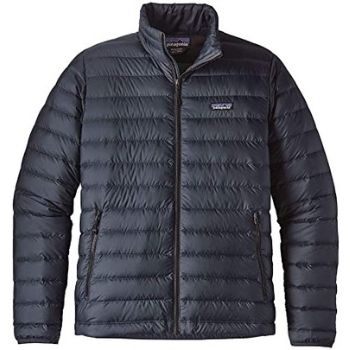
PROS:
✅ Durable
✅ Packable
✅ Sustainable design
CONS:
❌ Weight
KEY SPECS
- Weight: 13.1 oz (0.82 lbs)
- Fill weight: 1.4 oz
- Fill power: 800 fill power
- Shell material: Recycled Polyester Ripstop Shell
Patagonia’s Down Sweater has stood the test of time and has been one of our favorites for backcountry adventurers and urbanites alike. We found it is extremely durable and packable, folding down into one of its exterior zippered pockets.
Like most of Patagonia’s products, the Down Sweater is designed with sustainability in mind. It uses recycled materials, traceable down, and an environmentally friendly DWR finish, making it the most sustainable down jacket on our list. We like that it comes in a semi-slim fit, leaving a comfortable amount of room for layering.
Read our in-depth review on the Patagonia Down Sweater written by one of our expert gear testers. If you're also considering synthetic insulation, read our review on the Patagonia Nano Puff.
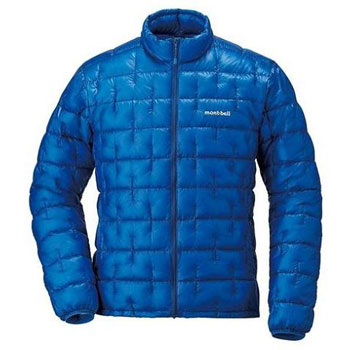
PROS:
✅ Weight
✅ High warmth to weight ratio
CONS:
❌ Durability
❌ Price
KEY SPECS
- Weight: 4.8 oz (0.3 lbs)
- Fill weight: 1.6 oz
- Fill power: 1000-fill
- Shell material: 7D Ballistic Airlight rip-stop nylon
With 1000 fill power down, the Montbell Plasma has the highest fill power and the lightest weight on our list. We found that minimal design made it highly compressible too. To keep the weight down the outer fabric is made from whisper-thin 7D ripstop nylon, and there are no interior or exterior pockets. However, the thin fabric makes the durability less than other models we reviewed. We like the weight to warmth ratio, although the small amount of fill means it’s best suited for most 3-season hikes. It’s also one of the more expensive models we reviewed. But If weight is your number one priority the Montbell Plasma offers a surprising amount of warmth in an ultralight package.

PROS:
✅ Warmest jacket on our list
✅ Excellent warmth to weight ratio
CONS:
❌ Price
KEY SPECS
- Weight: 10.8 oz (0.68 lbs)
- Fill weight: 4 oz
- Fill power: 900+ fill RDS goose down
- Shell material: Pertex Quantum brushed nylon with DWR
Feathered Friends is known for outstanding down quilts, and their down jackets are no different. The Eos is the warmest, puffiest jacket we reviewed filled with a whopping 3.7 ounces of 900 fill goose down. Because of its warmth, we think the Eos is exceptional as a stand-alone jacket and can be layered when the temperature plummets. We like that the jacket has a zip chest pocket and drawstring hood so you can cinch it up on those extra cold days. Price is our main drawback of the Eos. It is the second most expensive down jacket on our list. But if you need warmth, this is our top pick.
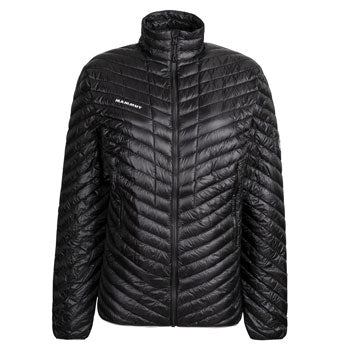
PROS:
✅ Great 4-season option
✅ Impressive warmth
✅ Designed for mountaineers
CONS:
❌ Price
❌ Weight
KEY SPECS
- Weight: 13.4 oz (0.84 lbs)
- Fill weight: 4.1 oz
- Fill power: 800 fill goose down
- Shell material: Pertex Quantum Material
Made with Mammut’s special soft, wind, and water-repellent Pertex Quantum material, this down jacket is one of the warmest on our list. We found it impressively weather-resistant (for down). The straightforward, ultra-warm design makes it a suitable match for 4-season hikes, or a skier looking for a mid-layer while hitting the slopes. It’s also one of the best options for mountaineers because of its dual climbing and backpack harness-friendly zipper pockets. We found the price and weight to be more than others on our list, but for mountaineering the Mammut Broad Peak is our top pick.
The Other Noteworthy Models

PROS:
✅ Warmth
✅ Premium option at a lower pricepoint
CONS:
❌ Weight
KEY SPECS
- Weight: 13.8 oz (0.86 lbs)
- Fill weight: 4.2 oz
- Fill power: 850 fill goose down
- Shell material: Pertex Quantum Diamond Fuse
We like REI products for doing a fantastic job pairing premium materials with affordability. The Magma 850 Down Hoodie 2.0 is no different. The use of 850-fill hydrophobic treated RDS down and the new Pertex Diamond Fuse fabric is top notch and looks the part. With a bit of a longer cut, we thought it worked well as a standalone jacket and has a large helmet-compatible hood for those brisk shoulder season adventures. We also found it to be fairly packable, stuffing into its own pocket. We don’t love the higher than average weight. And the fit of the jacket is a bit unique, with a lot of room on the shoulders. If you are looking for a trim fit consider sizing down.
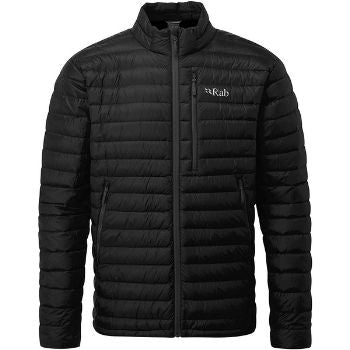
PROS:
✅ Durability
✅ Nikwax hydrophobic coating
CONS:
❌ Packability
❌ Weight
KEY SPECS
- Weight: 14 oz (Large) (0.88 lbs)
- Fill weight: 4.7 oz (Large)
- Fill power: 700 fill European goose down with Nikwax hydrophobic coating
- Shell material: Pertex Quantum Microlight
The Rab Microlight goose down jacket is warm and windproof thanks to its 750-fill down and Pertex outer shell. We found the Nikwax Water-Resistant Treated European goose down maintains its loft even when exposed to moisture, making it a good option for damp environments. When the temperature dropped it kept us toasty in temps in the low double digits. We found the jacket's drawcord hem and inner wind flap work well in blocking cold breezes. The jacket has an athletic, flexible shape, although the fit runs snug for most, especially on the sides and armpits. We don’t like that this is one of the heaviest and least packable down jackets on our list.
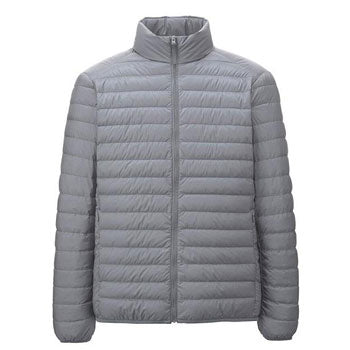
PROS:
✅ Price
✅ Weight
CONS:
❌ Durability
❌ Low fill power
KEY SPECS
- Weight: 8.3 oz (0.52 lbs)
- Fill weight: N/A
- Fill power: 640+ fill goose down
- Shell material: 20D nylon
We think the Uniqlo deserves mention for its incredibly low price tag. It is warm, has deep pockets, and uses a DWR-treated fabric to protect against moisture. We found that to reach this low price point features like an adjustable hood and hem were not included in this budget jacket. And we didn’t like that durability can be an issue with this jacket. The 640 fill isn’t the warmest for the weight of the models we reviewed. But if you’re looking for an inexpensive 3-season down jacket for outdoor adventures the Uniqlo is a good option.

PROS:
✅ Weight
✅ Warmth to weight ratio
✅ Packability
CONS:
❌ Price
KEY SPECS
- Weight: 8 oz (0.5 lbs)
- Fill weight: 2.5 oz
- Fill power: 850+ fill goose down
- Shell material: 12 denier nylon
Western Mountaineering’s QuickFlash Jacket uses an 850 down fill that shines for 3-season uses. We found it’s incredibly warm for its weight and packs down super small. To keep the weight low it comes with minimal extra features and no hood. For us the fit was slightly boxy and more relaxed. It’s the most expensive down jacket on our list, making it hard to choose over cheaper and higher-performing options like the Mountain Hardwear Ghost Whisperer.

PROS:
✅ Affordable casual jacket
CONS:
❌ Low warmth rating
KEY SPECS
- Weight: 9 oz (0.56 lbs)
- Fill weight: 2.8 oz
- Fill power: 650 fill RDS Down
- Shell material: 20-denier nylon
Eddie Bauer created the affordable Cirruslite down jacket that performs well for most 3-season uses. We like this casual no-frills jacket for casual everyday wear. Other budget options, like Forclaz 100 offer substantially better fill power and warmth (albeit a bit heavier), but the fit of the CirrusLite makes it feel like a more quality piece. Not everyone needs an ultralight, high fill-power jacket and Eddie Bauer seems to understand that. If you are looking for a casual fitting, DWR-coated down jacket that will work for trips around town and the occasional hike we recommend the Cirruslite.

PROS:
✅ Durability
✅ Sustainability
CONS:
❌ Weight
KEY SPECS
- Weight: 18.7 oz (1.17 lbs)
- Fill weight: 3.8 oz
- Fill power: 850 fill power RDS certified DownTek down
- Shell material: Pertex Quantum
L.L. Bean focused on using sustainable products during every stage of creating the Ultralight 850 Down Jacket. From environmentally friendly PFC-free coatings on the water-resistant down, to using the Responsible Down Standard. We found the fit will work for just about anyone and allows for layering underneath. Also, it is the only jacket on our list that is available in “tall”, which is 2” longer in the torso and 1” longer sleeves. Weight is our big drawback with the L.L. Bean, it's the heaviest jacket on our list.
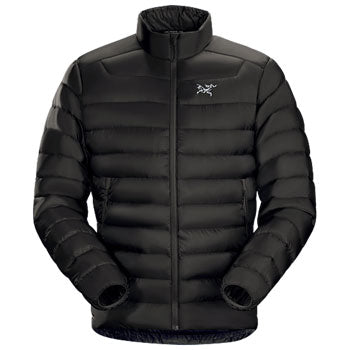
PROS:
✅ Breathability
✅ Good warmth to weight ratio
CONS:
❌ Price
❌ Durability
KEY SPECS
- Weight: 11.9 oz (0.74 lbs)
- Fill weight: 3.5 oz
- Fill power: 850 fill European white goose down
- Shell material: Recycled 15D Arato™ outer
The Cerium earns our praise for its warmth-to-weight ratio and its trim, athletic fit. The lightweight coat kept us warm in mild temperatures and would be toasty in the winter under a shell. To combat down's vulnerability to wetness, Arcteryx has placed Coreloft synthetic insulation in moisture-prone areas such as the armpits. We found the jacket has an impressively minimal and breathable design and the hood is a nice addition for extra warmth. The outer fabric of the jacket is thinner than other models we reviewed, so beware of tearing if worn alone. And the price is among the highest on our list. But overall, we recommend this as a great mid-layer piece that’ll have no trouble keeping you warm.

PROS:
✅ Extra rain protection
✅ Features
CONS:
❌ Weight
KEY SPECS
- Weight: 15.4 oz (0.96 lbs)
- Fill weight: 3.9 oz
- Fill power: 800+ fill RDS goose down
- Shell material: Pertex Quantum Diamond Fuse 15Dx30D and Pertex Shield 2.5L
Outdoor Research took the classic down jacket and made their own. The shoulders, hood, and upper sleeves use Pertex Shield 2.5L waterproof breathable material. We found that even in the rain this jacket offers decent protection. Additionally, we like that the new Pertex Quantum Diamond Fuse adds durability. The jacket has 2 big pockets on the inside, 2 hand pockets, and a chest pocket. While this jacket does weigh more than some in our review, the added protection against the elements and higher durability fabric make it a smart buy for the right conditions.
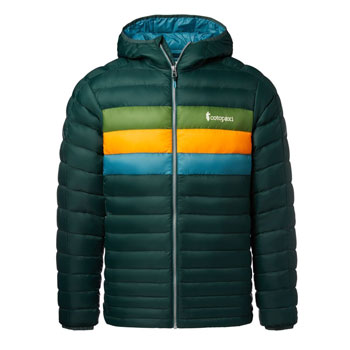
PROS:
✅ Fun design
✅ Durable
✅ Features
CONS:
❌ Low weight to warmth ratio
KEY SPECS
- Weight: 14 oz (0.875 lbs)
- Fill weight: N/A
- Fill power: 800 fill RDS goose down
- Shell material: 20 Denier Ripstop Nylon
For us, the Cotopaxi Fuego goose down jacket's most eye-catching feature is its range of colorful retro designs. That’s not to say that it’s all looks, we love that it’s also packed with extra features like ultra-soft fabrics, elastic binding (for extra protection against the cold), fleece-lined pockets, water-resistant down, stash and zipper pockets, and a zippered neck. However, all these features make it one of the heavier options on our list. Unfortunately, we found it scored low on warmth to weight ratio. We recommend it for urban users who want a jacket that occasionally can be taken into the backcountry.
Key Factors to Consider When Choosing
Total Weight
Down jackets should be lightweight and packable. We recommend less than 12 ounces for three-season hiking. To save weight make sure it’s free from unnecessary features like chunky zippers and heavy fabric.
The Lightest Down Jackets:

Warmth
Warmth is a combination of fill power, the measurement of a down’s loft, and fill weight, the amount of down in a jacket. Higher numbers are better in each case. Warmth can be tricky to evaluate when comparing jackets with different fill powers and weights. We will dive deeper into each of the considerations below.
The Warmest Ultralight Down Jackets:
- Feathered Friends Eos
- Mountain Hardwear Ghost Whisperer
- REI Magma 850 Down Hoodie 2.0
- Mammut Broad Peak Light
Down jackets with the highest warmth-to-weight ratio:

Price
Down jackets range from under $100 to $400+. Fill power, fill weight, and total weight all affect price. Premium down jackets often have the highest fill power and are engineered from the thinnest materials to keep them ultralight.
Down jackets that provide the greatest value:
Affordable down jackets:
Premium down jackets (most expensive):

Other Things to Consider
Warmth
FILL POWER: KEEP IT ABOVE 700
Fill power is a measurement of the loft of a down jacket. Specifically, it is the amount of space (cubic inch) an ounce of down will occupy at its maximum loft. This commonly advertised value can range from 300 to 900. The higher the number, the more loft the down will have and the better it will be at insulating. A higher fill power will require less down to keep you warm which is why most ultralight jackets use at least 650 down and heavier entry-level down jackets use 300 to 500 down.

FILL WEIGHT (percentage): AT LEAST 30% OR MORE OF TOTAL WEIGHT
Fill weight is the amount of down (ounces) used in the jacket. Ideally, you want down to occupy 30% or more of the jacket’s total weight.
Both fill power and fill weight contribute to the overall warmth of a coat. When comparing jackets with the same fill power, a higher fill weight means a warmer jacket. A higher fill power down requires less down for the same amount of warmth, so a 900-fill coat with 3 ounces of down may be warmer than a 500-fill jacket with 5 ounces.

While lighter does sound more attractive, be realistic about what you will be doing in your jacket and where you will be. A jacket with only a couple ounces of down probably won’t be the best choice for leisurely strolls in the frigid winter, but is perfect for shoulder season hikes or evenings at camp on the PCT. On the contrary, a jacket with 5 ounces of down will be overkill for most climates throughout the year.

Durability
Most down jackets are typically made with high-quality ripstop nylon that resists scuffs, scrapes, and tears. The thickness of this outer material is measured in denier, the weight of a thread. The lower the denier, the lighter and thinner the fabric. The nylon varies from jacket to jacket with ultralight jackets minimizing weight by using lighter denier nylon that requires some extra gentle handling. Most down jackets also have some form of outer DWR treatment to resist moisture.

Almost all jackets will have a face fabric, the side facing outwards, somewhere between 7-denier to 20-denier. With 7-denier being the epitome of ultralight materials, so wispy they are usually partially transparent. 20-denier is substantially more robust, however, most will fall within the 10-denier to 15-denier range. It is a balance between weight and durability. The benefits of down as a lightweight insulator are lost if extremely thick and heavy fabrics are used, that is why they will always tend to be relatively thin. Unless you are looking for the lightest possible jacket, and understand the precautions that must be taken, stick between 10-denier and 15-denier.
The most durable down jackets are:
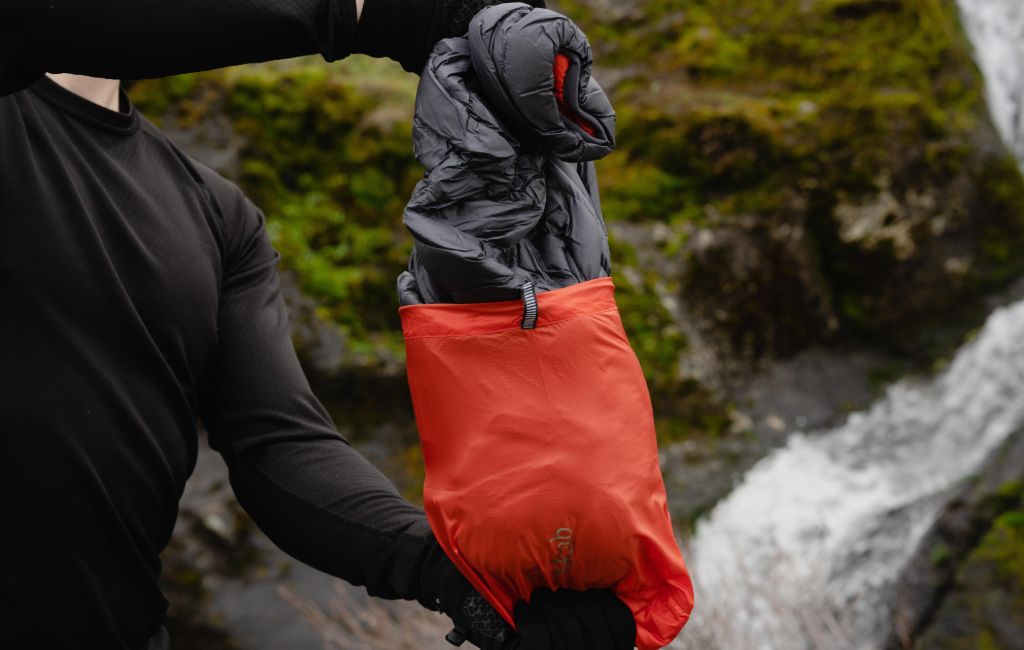
Packability/Compressibility
Down compresses better than any other material, which makes it great for packing away small. Down also retains its loft better than other materials and can withstand packing and unpacking countless times without breaking down. The higher the fill power the more compressible a down jacket is. Thinner fabrics offer minimal bulk and will pack smaller than thicker down jackets.

Most jackets take full advantage of this by either stuffing into themselves (commonly in a pocket with a reversible zipper) or by coming with a small stuff sack. These are great for temporary storage and can help save space for everything else. You should not store your jacket stuffed away for any long durations, when at home make sure it is allowed to fully loft.
The most packable down jackets are:
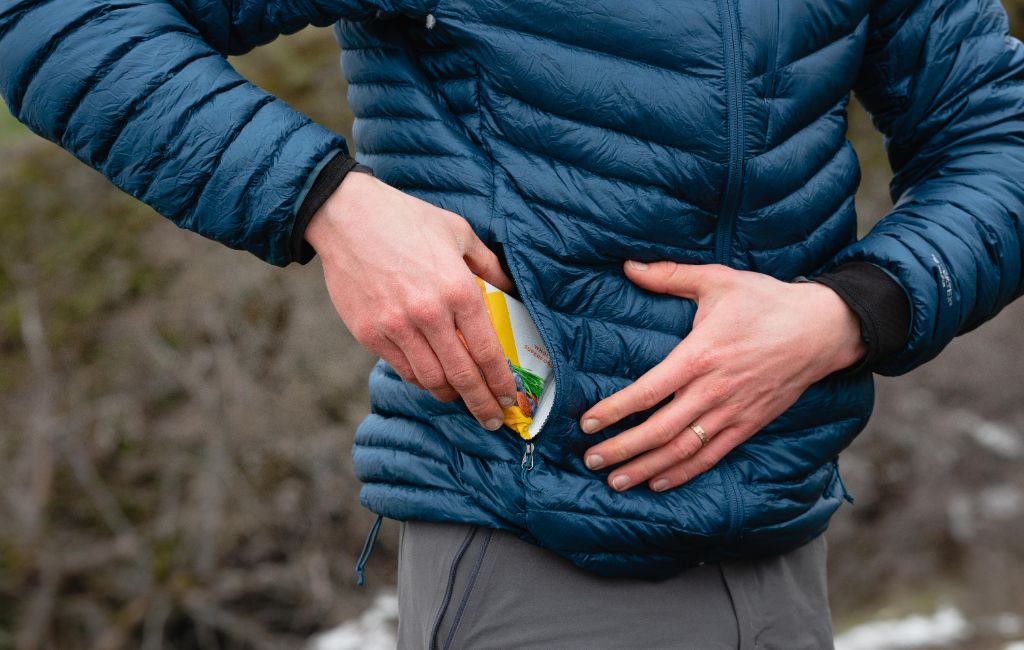
Baffle spacing
Down jackets are constructed using compartments called baffles to help evenly distribute the down. Baffle size can also have an effect on the insulating qualities of a jacket. Larger baffles can hold a lot more insulation and have more space for loft, but this space also allows the down to clump together producing cold spots. Smaller baffles are more challenging to construct, but they prevent clumping and provide an even distribution of insulation. Smaller baffle jackets also tend to be less puffy, making them ideal for layering under a shell.

DWR Coating
As good as down is, it has an Achilles heel, and that is moisture. Get a down jacket wet from sweat or rain, and it will lose its insulating power. DWR is a water-repellent coating applied to the outside of jackets, sleeping bags, and other outdoor gear as the first line of defense against moisture. It also is now being used internally to coat down fibers, so they don't lose as much of their loft and dry faster when they get wet. Nikwax, DownTek, and DriDown are common brands of hydrophobic down.

Types of Down
While goose and duck down are similar in warmth, compressibility, and durability, they do have their differences.
Goose: Goose down has been, and still is, considered the higher value. It’s naturally warmer and lighter, and because geese are larger than ducks their plumage is bigger and loftier. Goose down is less available than duck and it’s the more expensive option of the two.

Duck: Duck down has gained popularity in recent years as it’s easier to get, cheaper, and it holds up better than goose when wet. But since goose has a naturally higher fill power, it will always remain lighter than duck, especially the higher quality you go. However, modern-day technologies have developed a system of sorting, clumping, and weaving bunches of duck fibers together that can make it comparable to goose.

Sustainability
Controversy over how down is collected has led to the rise of Traceable Down and the Responsible Down Standard. Traceable down means the outdoors manufacturer can trace their down from the farm to factory, while the Responsible Down Standard is a voluntary standard that ensures that down-producing ducks and geese are being treated humanely. Both standards ban the practice of live plucking, which is the injury-causing removal of down from living animals.
The most sustainable down jackets are:

Hooded or not
Whether your down jacket has a hood or not is a personal preference. Some people like the coverage a hood provides around the head, neck, and shoulders, while others don't want the added bulk and cost associated with a hood. If you opt to go hoodless, you can always use a beanie or balaclava.

Pockets or not
Pockets are another optional feature on jackets. Removing the pockets sheds some weight, but you might miss that extra storage space or convenient hand holder.

Lining
Some down jacket manufacturers add an extra lining to help retain heat or wick away moisture. Linings add weight to a coat so you may opt for a jacket that is not lined and use your own layering system to add warmth or cooling as needed.

FAQs
Are down jackets worth it?
Yes, they are. Down jackets are worth it in cold but mostly dry weather or if having a lightweight, packable jacket is a priority for you. In very rainy conditions or if you're on a budget, synthetic insulations can be a better option.

What does a down jacket do?
A down jacket traps heat by using soft, insulating duck or geese feathers to keep you toasty warm.

Is a down jacket the warmest?
Yes, it is. A down jacket is the warmest option providing more warmth per ounce of insulation versus synthetic insulations.
📸 Some photos in this post were taken by Ross Enlow (@rossaenlow)






 650-Calorie Fuel
650-Calorie Fuel